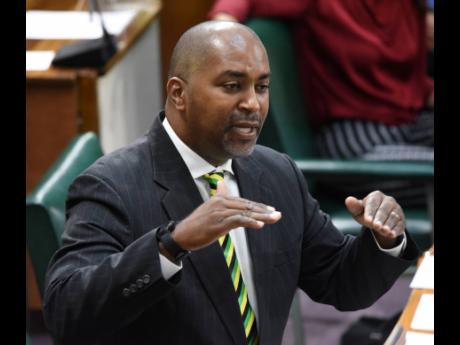Robinson bemoans ‘too many examples of bad governance’
Opposition lawmaker Julian Robinson is asking persons in the private sector and civil society to be more vocal about standards for good governance, even as he called for more qualified professionals to make themselves available to serve on public boards.
In his keynote address at Thursday’s weekly meeting of the Rotary Club of Kingston, Robinson, who is also member of parliament for St Andrew South Eastern, said that such a move could enhance accountability and integrity in governance.
“We have had, particularly in public-sector agencies, too many examples of bad governance,” he said, urging Rotarians to let their voices be heard.
Much work to be done
Noting the passage of the Public Bodies Management and Accountability (Nomination, Selection and Appointment to Boards) Regulations in the House last month, Robinson said there was still much work to be done.
“It doesn’t take away from ensuring that we still appoint individuals who have integrity and who are principally committed to serving the public interest, versus their own private interests,” he said, urging the Rotarians to get on public boards to lend their expertise in various fields to national development.
In a wide-ranging address, Robinson also called on the Government to “ride and whistle” as it implements recommendations from the Professor Patterson’s report on education reform by also putting remedial classes in various places, and providing vocational training for some of the estimated 120,000 students who had suffered significant learning loss because of COVID-19 disruptions in the education sector.
He further recommended that diagnostic tests be used to determine the full extent of the learning fallout.
“We have pretty much moved students through the system, meaning that, if you were in fourth form last year, you have gone to fifth form without necessarily assessing the extent to which those students have grasped the concepts from their prior years, and whether they are really truly equipped to be in the upper grades that they have now moved into,” he said.
Pandemic’s impact on microbusinesses
Turning to the pandemic’s impact especially on microbusinesses, the opposition spokesman on finance said that while the Government had provided support through the Development Bank of Jamaica and venture funds had also been put in place, these measures had mainly assisted formal, established businesses, which were already able to access grants or equity funding.
He charged that many microbusinesses – such as corner shops, which are not on the grid, not paying taxes and employ between one and five persons – have not received the kind of support they need.
“There has to be an effort to incorporate many of these businesses into the formal system,” Robinson said.
Noting that tourism had been recovering well, he called for more attention to be paid to agriculture and manufacturing, especially as the global supply chain issues brought these sectors into sharp focus.

